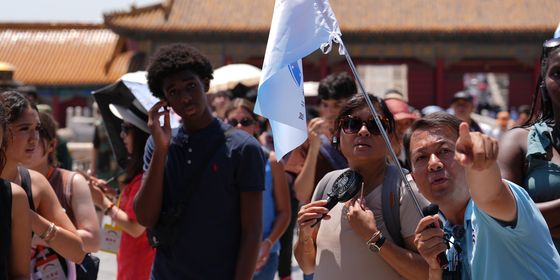Is Didi going to roll out an English interface soon? Based on Didi’s current ambitions, we can speculate
There are rumors of a possible upcoming English-language for the popular Chinese car hailing app Didi Chuxing. So far, the app has been available only in Chinese, and is currently the biggest car hailing app in China.
While this might sound like a pipe dream, there is anecdotal evidence to support this fantastical claim—a short thread on Reddit, and a French-language blog post about how the blogger’s Didi Chuxing interface suddenly changed from Chinese to English, and then three days later, changed right back to Chinese again.
The blogger, Mathieu, noted that “like many translations of Chinese apps,” this one was partial. The addresses, ordering and cancelling, and app navigation were in English, while settings and the Didi point-accumulation function were not.
Last year, Didi emerged victorious from battle with global car-hailing giant Uber for dominance of the Chinese market. This proved to be the end of Uber as a foreigner-friendly car ordering option—a few months after Didi merged with Uber China, users could no longer use an English interface. Neither could they use the app outside of China or link international credit cards to the app. Hence the current excitement about Didi’s (surreptitious) testing of an English-language interface.
This could be part of Didi’s new push to join the international car-hailing arena. SCMP reported last week that Didi has restructured to form a new international business unit. Didi’s CEO, Cheng Wei, and president, Jean Liu Qing, announced that the company is striving to become “the world’s leading automotive network operator and leader in new transportation technologies” in the next five years.
The company has been making strides towards internationalization for a few years now. Even before Didi forced Uber out of the Chinese market, Didi was undercutting Uber’s market share in its home country, the United States, by investing in Lyft—now Uber’s main US competitor. Didi has also invested in car-hailing operators in Ola in India and Grab (formerly GrabTaxi) based in Singapore. Together, these companies are forming what commentators have dubbed the “Anti-Uber Alliance.”
It seems like Didi is only getting started, having announced an investment of over 100 million US dollars in a Brazil-based car hailing company, 99 (formerly 99Taxi).
As Didi expands globally, we foreigners in China will be keeping our fingers crossed for a sweet, sweet English interface!
Cover image from mydrivers.com












